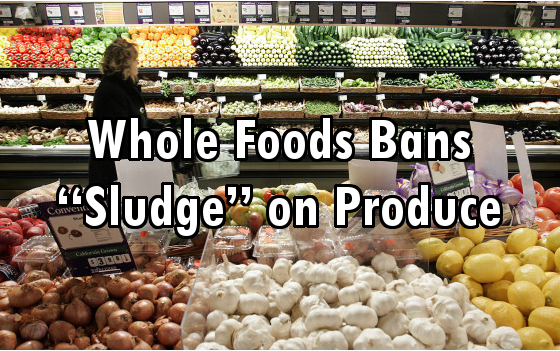Whole Foods Bans “Sludge” or Human Feces on Produce

 Whole Foods, the health food store giant across the country, recently announced a new rating system for their produce in an effort to help their consumers make informed decisions. When the rating system rolls out in September, there will be something missing from the production of Whole Foods fruits and vegetables, and that something is called “sludge.” Sludge, also referred to as biosolids, is fertilizer made from municipal waste. In other words, sludge contains human poop.
Whole Foods, the health food store giant across the country, recently announced a new rating system for their produce in an effort to help their consumers make informed decisions. When the rating system rolls out in September, there will be something missing from the production of Whole Foods fruits and vegetables, and that something is called “sludge.” Sludge, also referred to as biosolids, is fertilizer made from municipal waste. In other words, sludge contains human poop.
Sounds like a good thing, right? To know that your food won’t be grown in the feces of your neighbor or strangers from across the country. But some say Whole Foods decision is simply one of business and marketing, that using sludge as fertilizer isn’t only harmless, but actually a sustainable and environmentally-friendly practice.
The USDA’s Organics Program doesn’t allow the use of biosolids in organic fields. For Whole Foods, eliminating sludge is a way of getting closer to these standards without having 100% organic produce. They say the ban actually won’t impact any of those growers because their growers don’t use biosolids to begin with (which interestingly supports the notion that their decision is more for-show than for-cause).
Several organizations campaign against food producers using sludge in their farming practices. They point to the chemicals and heavy metals present in the waste, saying they put consumers at risk of ingesting toxins or even getting ill. But others say that simply isn’t a realistic concern.
Read: 5 Foods You can Grow Using Organic Produce
“Our material is extremely clean, and the metals that are in there are at extremely low levels,” Chris Peot of the District of Columbia Water and Sewer Authority tells The Salt. “There are trace amounts of flame retardants, but they’re ubiquitous in the home now, where you’re much more likely to be exposed to dangerous levels of them. Still, we need to be ever vigilant, and continue to look for new chemicals that might be risky, so we do.”
Flame retardants—no big deal. After all, we have them in our homes, so what’s the big worry about ingesting them on vegetables treated with poop?
Human fertilizer has been used for ages. In some areas, it’s referred to as “night soil” and is seen as a low-cost (free, actually) method of providing vegetables with the nutrients they need, and doing it without chemical applications.
Years ago, before the majority of Americans were walking around with toxins in their bloodstreams and traveling through their digestive systems, biosolids may have been a better idea, one where transferring these toxins back into the foods wouldn’t be a concern. If we were eating natural, organic diets and growing our own foods, using night soil would pose fewer risks. But that simply isn’t the case today.
Because these treated biosolids are a collection of waste from people from all walks of life with unknown health practices and diets, and they are further treated with chemical processes before being put back into the system as fertilizer, their use does raise some concerns. Though Whole Foods’ recent decision may have been all for show, it does raise an interesting topic that even the most conscientious consumers may not be aware of.

The pharmaceutical and chemo/radiation treatment residues of populations awash in psychotropics and birth control pills is certainly something to worry about. Doesn’t sludge include all the run-off in sewers too? I, like most people, don’t know enough about this unspoken subject.